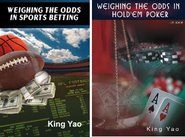Before I start my post on the second SNG I played, let me state the following:
1. I have little experience in these games, so I am bound to make many mistakes.
2. I will learn from those mistakes through experience, reading books, reading emailed comments (email me! kingyao@ NO SPAM comcast.net)
3. The whole process for me is more about the intellectual aspect, thinking about the game, maybe writing a new chapter in the book.
Feb 12 2006
Ultimate Bet $20 + $2
No Limit Sit-N-Go TURBO
Place: 4 out of 10
Comments:
Knocked out in fourth place with 77 vs AKo. Flop came a Q and a J and Rivered a T for a straight.
This was a Turbo SNG so the blinds went up quickly. I didn't lose all my chips on 77 vs AKo, but I lost almost all of it - enough to make it very unlikely that I could come back (I think I had 170 left after losing that hand, the table as a whole had 15,000). I was in the big blind and the button raised T500 with about T1800 left in his stack. I went all in with T2500 with my 77 and he called. Nothing wrong with either my play or his play, or so I think. I thought I'd probably be a favorite, but it was close.
What are the chances he calls my raise given he has raised?
I think very high. For his T1800, the pot is T2900, so since he has raised, his hand is probably strong enough to call given those odds.
What are the chances I am ahead?
If he has a over-pair, I am only about 20%.
If he has an under-pair, I am about 80%.
If he has two unsuited overcards, I am about 57%.
If he has two suited overcards, I am about 53%
What are the chances he has each possible hand?
Over-pair: AA, KK, QQ, JJ, TT, 99, 88: 42 combinations
Under-pair: 66, 55, 44, 33 (I'll assume he doesn't raise with 22. Some people may, others may not raise with 33 or 22, so just deleting 22 is probably a decent round off figure): 24 combinations
Two unsuited overcards: AK, AQ, AJ, AT, A9, A8, KQ, KJ, KT: 108 combinations
Two Suited overcards: AK, AQ, AJ, AT, A9, A8, KQ, KJ, KT: 36 combinations
Overall in percentages:
Over-pair: 20%
Under-pari: 11.4%
Unsuited Overcards: 51.4%
Suited Overcards: 17.2%
Multiply the overal percentages of cards that the opponent could be holding by my chances of 77 beating those hands, and we get: (20% x 20%) + (11.4% x 80%) + (51.4% x 57%) + (17.2% x 53%)
51.5%
So that was my EV in that hand. I'm not adding in the possbility he may fold a weaker hand like QTs or something like that. Of course these probabilities will change based on changing assumptions. As I get more experience, I think I'll be able to adjust the assumptions to fit actual play more accurately.
Was it worth it?
This SNG paid 3 places. $100 for first, $60 for second, $40 for third. I got knocked out in 4th place in a situation where I was only a slight favorite. Maybe it wasn't worth it if I am maximizing value. There isn't that big of a difference betwee 1st and 3rd place. So in retrospect, the better play is probably to fold the hand given that he should be highly likely to call if I raised all in.
What about calling his raise, and then making a decision on the Flop?
Hmmm....that's a good question that I'm not ready to answer yet.
On a separate note, there was an interesting player earlier in the SNG. He played a ton of hands. Not only calling unreasonable amounts with unreasonable hands, but also raising back at times. What do you do against this type of player? I think the best way to play against him is to find a situation where you would have a small edge against most players, but probably a large edge against him (since he will call with many more hands than most players) and then push all in. Don't twiddle and bet a small amount hoping to draw some chips from him...he's willing to give it to you. Player types are important in all forms of poker, and assessing them quickly in SNGs, where it is less likely to meet up against a player you've played against before, is important.
Subscribe to:
Post Comments (Atom)


No comments:
Post a Comment